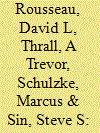| Srl | Item |
| 1 |
ID:
079579


|
|
|
|
|
| Publication |
2007.
|
| Summary/Abstract |
To many scholars, the Bush administration's ability to convince a majority of the public to favor war with Iraq represents a dangerous failure of the marketplace of ideas. A healthy marketplace, they argue, would have produced a more robust debate over the administration's justifications for war, revealing their weakness. In this paper I argue that these scholars have based their arguments on a poorly specified model of the marketplace of ideas and that Iraq does not represent a failure of the marketplace. Contrary to conventional wisdom, the strength of the marketplace lies not in its ability to move the nation toward truth via debate and deliberation, but in its tendency to divide the public into countervailing factions based on competing sets of values and competing frames of the issues at hand. I develop this argument first by elaborating a model of the "marketplace of values" and redefining threat inflation as a process of efforts to frame security issues for the public. I test my model first against public opinion data regarding American threat perceptions and then use it to explain the Bush administration's successes and failures in building and maintaining public support for the war in Iraq
|
|
|
|
|
|
|
|
|
|
|
|
|
|
|
|
| 2 |
ID:
114155


|
|
|
|
|
| Publication |
2012.
|
| Summary/Abstract |
Despite strong empirical evidence for democratic peace theory, the historical record indicates that democracies have been involved in many wars. This article conducts a critical examination of how democratic polities become entangled in international conflict. The examination focuses on how democratic leaders manage domestic politics and public opinion at each stage of the conflict (i.e. disputes, crises, wars and settlement). The study explores how democracies are drawn into conflict; when democracies provoke conflict; what claims democratic leaders make to justify conflict; when domestic audiences support or oppose conflict; and the implications for democratic leaders after conflicts. It argues that democratic leaders pursue various strategies that are shaped by the stage of the conflict, the domestic institutional structure and the level of mobilised domestic opposition.
|
|
|
|
|
|
|
|
|
|
|
|
|
|
|
|